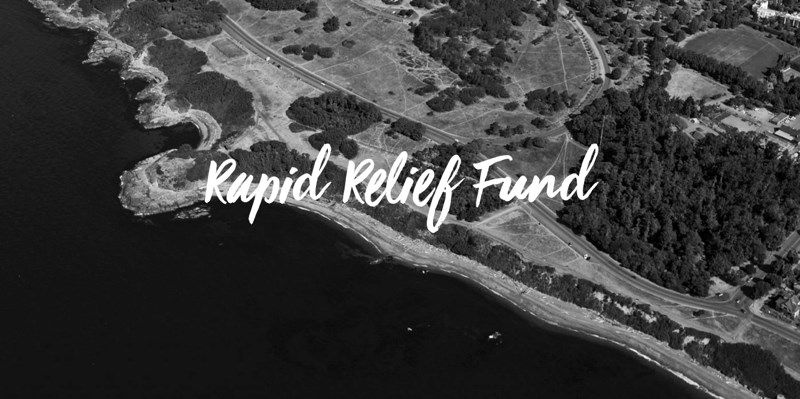Donate at RapidReliefFund.ca, more options below.
The Victoria Women’s Transition House Society is scrambling to keep its services and supports intact amid the COVID-19 pandemic, which is leaving many women isolated in their home, sometimes with abusive partners.
“We do know when people are in isolation, the longer they are in isolation, the more vulnerable they are,” executive director Makenna Rielly said.
As the virus spread, the society moved quickly to make sure staff who could work from home were set up to do that to prevent interruption of its ongoing counselling programs for older women and for children who have witnessed violence.
“We were all bracing, getting everyone ready for the onslaught of calls, and really in the past 10 days, we have seen a huge increase in people calling our 24-hour crisis line,” said Rielly. “Our calls have almost doubled. So we’re increasing our crisis-line counsellors to handle the calls. And our programs are still going and still going strong.” (The crisis line number is 250-385-6611.)
This week, the Rapid Relief Fund put another $869,000 to work in the community to support people in need. The fund — set up by the Victoria Foundation, the Jawl Foundation and the Times Colonist — has raised close to $4 million.
Rielly was thrilled to hear the Victoria Women’s Transition House Society will receive $100,000.
“This is going to help,” she said. “We can’t thank the community enough for this support at this time because we are providing a tremendous amount of additional services and we rely so heavily on community donations. We know there are a lot of people who normally donate who aren’t working and don’t know what their work is going to look like. We’ve been very concerned about our donation side. So for the community to swoop in here and do this is just so exciting for us. We are so grateful.”
The society has changed its protocols for cleaning and sanitization, scrambled for cleaning supplies and increased staff to do the cleaning.
“We’re concerned about protecting the people in the shelter and protecting the staff.”
Rielly has noticed that vulnerable women are taking the directive to stay home and isolate very seriously — until their situation becomes too bad.
“Then they’re looking for support, because it could be life and death,” she said.
Typically, someone will stay at the shelter for 30 days while staff work to find them a place in the community. But sometimes, when a person is placed in the community, they go home within two days.
“They leave for a multitude of reasons — the violent partner is threatening the pet, the victim’s parents or the children. Sometimes, the decisions are really out of their hands.”
The pandemic has also created backlogs in terms of placing someone in a new place in the community. People aren’t moving out of their apartments, and movers are unwilling to move furniture into an apartment and want to just drop things on the sidewalk.
“So people are stuck at home and stuck at the transition house,” said Rielly, who expects the number of vulnerable women seeking help at the shelter will increase.
“It’s quite a process for someone to decide to take that step, especially with children. But we are seeing more requests and the money will definitely help us support the women in their decision to come in.”
Helping people isolated with violent partners is putting an incredible strain on the society, said Rob Janus, communications director for the Victoria Foundation.
“It’s heart-wrenching and amazing at the same time,” said Janus.
This week’s grants will be given to Our Place Society, the Goldstream Food Bank, several seniors groups, PEERS Victoria Resources Society, which deals with a very at-risk population, the Victoria Immigrant and Refugee Centre Society and the Intercultural Association of Greater Victoria, among others.
“I was really just blown away by the breadth of supports that are represented,” said Janus. “It is really spanning the full range of financial, health, economic, counselling supports and supports for people just navigating how to get support from a government agency or service and the types of population that are represented as well, from families to seniors to homeless populations, to sex workers to victims of violent crime. It’s just such an amazing array.”
Janus said he still has to catch his breath when he says the Rapid Relief Fund is just shy of $4 million.
“We’re not even 2.5 weeks into this campaign and we’re saying we’re almost at $4 million. It just boggles the mind. The generosity of the community is unbelievable and it’s not showing any signs of letting up here.”
HOW TO DONATE
Tax receipts will be issued. If you are open to receiving your tax receipt by PDF, please include an email address with your donation.
• Online: RapidReliefFund.ca
• Phone: 250-381-5532
• Mail: Send cheques (made out to the Victoria Foundation) to RapidRelief Fund, Victoria Foundation, 200-703 Broughton St., Victoria V8W 1E2
The Rapid Relief Fund was created by the Victoria Foundation, the Jawl Foundation, and the Times Colonist to help people in need as a result of the COVID-19 pandemic. CHEK Television, Coast Outdoor Advertising and Black Press are helping to boost awareness. Every dollar received from donations goes out as grants to the community.
Donations are being distributed through the Victoria Foundation.



